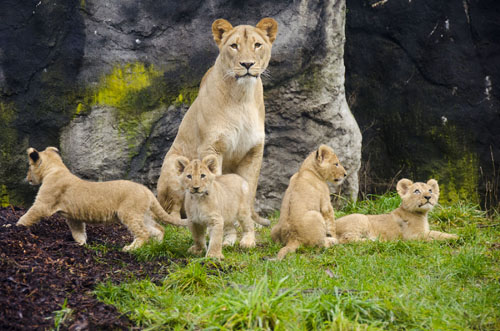SEATTLE, 2013-03-04 — /travelprnews.com/ — Four African lion cubs are ready for their close-up at Woodland Park Zoo, after living in an off-view maternity den since their birth in November.
Beginning Saturday, February 16, the 3-month-old cubs and mom are scheduled to be on view from 11:00 a.m. to 2:00 p.m. daily in the lion shelter located in the award-winning African Savanna. Viewing hours may vary or may be canceled for the day due to weather and veterinary examinations, and will increase incrementally as the cubs continue growing.
The cubs, two females and two males, were born November 8 to 3-year-old mother Adia (ah-DEE-uh) and 14-year-old father Hubert. The last birth of African lions at the zoo was in 1991. The cubs mark the first litter for the mother.
For the past two weeks the cubs have been exploring the outdoors through a series of introduction sessions. According to animal management staff, the youngsters have adjusted quite well and are ready to meet the public. “All four cubs are doing exactly what they should be doing at their age. They’re playing, they’re romping around, and they’re exercising predatory instincts such as mock stalking, pouncing, mouthing and biting,” said Martin Ramirez, mammal curator at Woodland Park Zoo.
A temporary chain-link fence has been installed in the lion exhibit to provide a protective barrier between the cubs and the moat. “The 13-foot-high fence also creates a small yard to help Adia keep track of her family in an outdoor setting. It’s another good learning experience for the first-time mom,” explained Ramirez.
The cubs continue to nurse and will do so until they are about 9 months old. They also are sampling solid foods such as ground turkey and beef.
When the cubs are not on view, the father and a 13-year-old female lion, named Kalisa, may be in the outdoor exhibit.
The cubs have not yet been named. The zoo plans to invite the community to help name two of the cubs through a public contest. More information will be announced next week atwww.zoo.org/lioncubs.
The lions at Woodland Park Zoo belong to the South African subspecies, Panthera leo krugeri. It ranges in Southern Sahara to South Africa, excluding the Congo rain forest belt, in grassy plains, savanna and open woodlands.
The African lion is the only big cat not protected under the Endangered Species Act. As few as 32,000 African lions are estimated to remain in the wild and their future remains uncertain, particularly as the growth in human population continues to impact lion populations. There is legal hunting of lions and retaliation killing because they pose a threat to humans and livestock. “Sadly, lions are being increasingly killed in Africa to meet the demands of the illegal trade of wild animals and wild animal parts for the medicinal trade market in Asia,” said the zoo’s Vice President of Field Conservation, Dr. Fred Koontz.
Many lions have died in the Serengeti due to canine distemper. Lastly, expanding agricultural and grazing regions have greatly reduced lion habitat, in turn increasing the risk of inbreeding and the loss of genetic viability.
The U.S. Fish and Wildlife Service has recently completed a public comment period, and is currently conducting a review of the African lion’s status in order to determine if the lion requires protection under the Endangered Species Act (ESA). The Service will review the best available scientific and commercial information from the public, range country governmental agencies, the scientific community, and other interested parties prior to issuing a proposal.
Through the zoo’s Wildlife Survival Fund, Woodland Park Zoo supports the Ruaha Carnivore Project through the Lion Species Survival Plan Conservation Campaign. The project works in Tanzania to mitigate human conflict with lions and other large carnivores that share the Ruaha landscape, while collecting baseline data on lion populations to help shape lion and large carnivore conservation.
Woodland Park Zoo participates in 72 Species Survival Plans ‒ from butterflies to South African lions ‒ sponsored by the Association of Zoos & Aquariums (AZA). Led by experts in husbandry, nutrition, veterinary care, behavior, conservation and genetics, AZA-accredited institutions manage each species as one population in North America to maximize genetic diversity, with the goal of ensuring the long-term survival of the population and the health of individual animals. SSPs also involve a variety of other collaborative conservation activities such as research, public education, reintroduction and field projects.
Woodland Park Zoo winter hours: 9:30 a.m. to 4:00 p.m. daily. Winter admission: Adult (13-64) $12.75; Child (3-12) $8.75; Toddler (0-2) free. Active, retired, and veteran U.S. military and their families, seniors and people with physical disabilities receive an admission discount. Zoo members receive free zoo admission year round. Parking: $5.25.
Go to www.zoo.org/rainyday and check if a Rainy Day Discount coupon has been posted for the day. Discount coupons, when offered, are good for 50% off on all regular admissions to the zoo, limit four admissions per coupon. Present a printed coupon or show the coupon on your phone at the gate.
For more information or to become a zoo member, visit www.zoo.org or call 206.548.2500 or 548.2599 (TTY).
Accredited by the Association of Zoos & Aquariums, award-winning Woodland Park Zoo is famed for pioneering naturalistic exhibits and setting international standards for zoos in animal care, conservation and education programs. Woodland Park Zoo is helping to save animals and their habitats in the Pacific Northwest and around the world. By inspiring people to care and act, Woodland Park Zoo is making a difference in our planet’s future. For more information, visit www.zoo.org.
###
Woodland Park Zoo saves animals and their habitats through conservation leadership and engaging experiences, inspiring people to learn, care and act.
Gigi Allianic, Caileigh Robertson
206.548.2550 | woodlandparkzoopr@zoo.org

